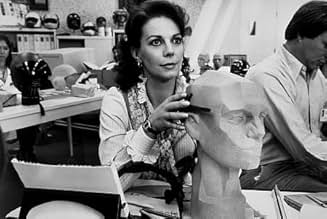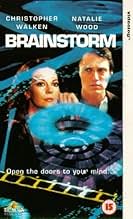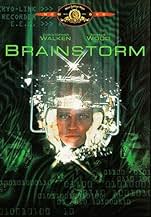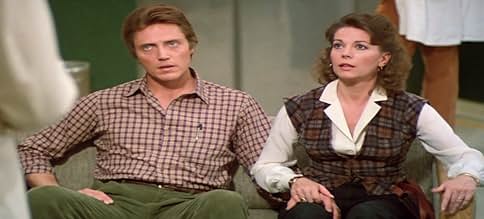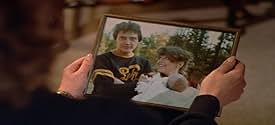IMDb-BEWERTUNG
6,4/10
13.946
IHRE BEWERTUNG
Forscher entwickeln ein System, mit dem sie in die Köpfe der Menschen springen können.Forscher entwickeln ein System, mit dem sie in die Köpfe der Menschen springen können.Forscher entwickeln ein System, mit dem sie in die Köpfe der Menschen springen können.
- Regie
- Drehbuch
- Hauptbesetzung
- Auszeichnungen
- 2 Gewinne & 6 Nominierungen insgesamt
Ira David Wood III
- Barry
- (as David Wood)
Mary Fran Lyman
- Realtor
- (as Mary-Fran Lyman)
Empfohlene Bewertungen
One of the things I really liked about "Brainstorm" is that it feels related to "TRON". This is in more than just the technological/corporate themes, but also in the lab scenes and some of the (excellent) locations. Evidently, this is Natalie Wood's final performance (and it's a good one) but the characters are the least engaging aspect of the movie. It has its virtues, but there isn't really anyone here to latch onto; except for one, whose death really gives the movie some emotional weight (thanks to his/her performance).
It's the science fiction that takes center stage with this movie. What if two people can share sensory experience through telepathy? What happens when the money men take over the equipment to turn a profit? Even creating a mixtape out of sense data is intriguing. The ideas are the fun part. What's weird is seeing a bored Christopher Walken.
6/10
It's the science fiction that takes center stage with this movie. What if two people can share sensory experience through telepathy? What happens when the money men take over the equipment to turn a profit? Even creating a mixtape out of sense data is intriguing. The ideas are the fun part. What's weird is seeing a bored Christopher Walken.
6/10
I first watched Brainstorm when I was barely a teenager and was fairly impressed, an impression that lasted to date. For the first time, I'd seen a movie where someone was presented with amazing options, and the movie actually covered everything I'd have thought of. Unlike in those flicks where someone would get three wishes and never would wish to get as many wishes as they wanted (or happiness ever after, or instant death, or whatever), "Brainstorm" explores all possible consequences of the introduction of new, ground-breaking options:
A team of scientists comes up with a way to *really* share experience, to let each other in on how they experience the eternal essentials; love, life, sex; even death. And then, it doesn't stop there, taking into consideration the dark side as well -- what happens if you share your pain as well? What happens if The Wrong People(TM) monopolize the Amazing Secret(TM) first?
I love this movie. It ties up eternal questions and hopes with fun F/X and combines them into a touching and thrilling plot that makes other movies (mostly of the "cyberpunk"-era) like "Strange Days" that exploit a similar theme seem anemic in comparison at best.
A team of scientists comes up with a way to *really* share experience, to let each other in on how they experience the eternal essentials; love, life, sex; even death. And then, it doesn't stop there, taking into consideration the dark side as well -- what happens if you share your pain as well? What happens if The Wrong People(TM) monopolize the Amazing Secret(TM) first?
I love this movie. It ties up eternal questions and hopes with fun F/X and combines them into a touching and thrilling plot that makes other movies (mostly of the "cyberpunk"-era) like "Strange Days" that exploit a similar theme seem anemic in comparison at best.
Everyone knows this was Natalie Wood's last film, and that some of her scenes were filmed after her death with a stand-in you only see from behind. Director Donald Trumball, best known for his special effects work in Blade Runner, Close Enounters, and Star Trek, chose this time to build his story on plot and character development, a good choice given the enormous talent he had to work with. Trumball's battle with studio execs to finish the film after Wood's death, rather than claim the insurance proceeds and call the film off, ended his career in Hollywood, but assured that this gem would not be lost. It is somewhat ironic that Natalie's swan song should be a sci-fi movie, since she was hardly known for work in the genre, but she brings a grace and charm, as well as depth and beauty, to the genre that is usually lacking.
Most sci-fi films based on technology don't age well, and there are times where this is no exception. The idea of recording on tape, let alone making tape loops, must seem like wax cylinder recordings to today's MP3 generation. The tapes themselves were props borrowed from a film being shot nearby, and that film was itself a dismal failure. But the concept is timeless, and so well done that, all in all, the film still works as well as it did in 1983.
Lesser screenplays would have been content with the main story line; scientists invent a way to record brainwaves and play them back for a real life out of body experience, and for just such a stinker, check out Strange Days. But then along comes the incomparable, utterly fabulous Louise Fletcher, who, as one of the co-inventors of the aforementioned device, records her death when she suffers a heart attack while working late one night. For the rest of the film, people are either trying to play the tape or prevent others from playing it. Meanwhile, the technology gets hijacked by two-dimensional government lackeys trying to exploit the weapons potential of the invention.
One can easily pick out scenes of this movie to vilify or exalt, all these years later, and any object viewed over time eventually has a vanishing point. The almost slapstick scene where the assembly robots go berserk is one example of a scene that, while consistent with its contemporaries, is silly today. The death scene, though much maligned, is equally misunderstood, and provides the metaphysical underpinnings that elevate Brainstorm above mere gadget flicks. Brainstorm is about exploring experience, life, love, even death, from the point of view of others, and Academy Award winner Louise Fletcher allows us to do so through her consummate skill in presenting a death scene of sufficient awe and wonder to warrant exploration.
If you want to find out what else happens, watch the film, but when you do, don't ignore the beautiful, delicate interplay between Christopher Walken and Natalie Wood. Their careening relationship seems somehow tied to the invention they helped make, and there are sequences so beautiful that I sometimes take out the DVD just to marvel at them.
Despite changing styles in special effects, this is a timeless and beautiful story that transcends the genre and, with Walken, Wood and Fletcher, becomes more than just a story about shiny gold tapes that record brain waves. It's more about immovable objects and irresistible forces and what happens when they collide. Intrigued? Good. Go watch it.
Most sci-fi films based on technology don't age well, and there are times where this is no exception. The idea of recording on tape, let alone making tape loops, must seem like wax cylinder recordings to today's MP3 generation. The tapes themselves were props borrowed from a film being shot nearby, and that film was itself a dismal failure. But the concept is timeless, and so well done that, all in all, the film still works as well as it did in 1983.
Lesser screenplays would have been content with the main story line; scientists invent a way to record brainwaves and play them back for a real life out of body experience, and for just such a stinker, check out Strange Days. But then along comes the incomparable, utterly fabulous Louise Fletcher, who, as one of the co-inventors of the aforementioned device, records her death when she suffers a heart attack while working late one night. For the rest of the film, people are either trying to play the tape or prevent others from playing it. Meanwhile, the technology gets hijacked by two-dimensional government lackeys trying to exploit the weapons potential of the invention.
One can easily pick out scenes of this movie to vilify or exalt, all these years later, and any object viewed over time eventually has a vanishing point. The almost slapstick scene where the assembly robots go berserk is one example of a scene that, while consistent with its contemporaries, is silly today. The death scene, though much maligned, is equally misunderstood, and provides the metaphysical underpinnings that elevate Brainstorm above mere gadget flicks. Brainstorm is about exploring experience, life, love, even death, from the point of view of others, and Academy Award winner Louise Fletcher allows us to do so through her consummate skill in presenting a death scene of sufficient awe and wonder to warrant exploration.
If you want to find out what else happens, watch the film, but when you do, don't ignore the beautiful, delicate interplay between Christopher Walken and Natalie Wood. Their careening relationship seems somehow tied to the invention they helped make, and there are sequences so beautiful that I sometimes take out the DVD just to marvel at them.
Despite changing styles in special effects, this is a timeless and beautiful story that transcends the genre and, with Walken, Wood and Fletcher, becomes more than just a story about shiny gold tapes that record brain waves. It's more about immovable objects and irresistible forces and what happens when they collide. Intrigued? Good. Go watch it.
Brainstorm had a rocky road to completion. After Natalie Wood died before completion of shooting, the studio wanted to shut it down and cash in the completion bond. Trumbull had fought tooth and nail to get the film made to begin with, and when it looked like it would be snatched from the jaws of victory, he hunkered down and dramatically altered sequences to prove it could indeed be finished without Wood's unshot scenes.
The "recorded memory" sequences were even more vivid for us in Indianapolis who saw it at the Eastwood theatre. The Eastwood had one of the few curved Cinerama roadshow screens outside of New York and Hollywood's Cinerama Dome. Think of it as a smaller version of an Omnimax screen. Sitting in the front row, you were completely enveloped by the film, and the visual and audio effect when the "memory" sequences lit up were quite attention grabbing. Trumbull was at this time working on his ill-fated Showscan process for amusement park rides, and was very interested in audience perceptions of diffrent lenses and frame rates. Some of this is used in Brainstorm. It's just not the same on a TV set of any size.
The central core of the story - the recording of the death of Lillian and Michael's obsession to experience it - is a disturbing one, because it explores the very nature of life and death. It can satisfy or dissappoint, because Trumbull has put his vision of memory, experience, death and afterlife on film for everyone to take pot shots at. And they did. It's a shame, because the film is beautiful, thought provoking, and ingenious. Yeah, I know, it has all of that evil government plot boilerplate. Look past it.
(It even revels in the quirks of the researchers, showing the second thing everybody does with new technology is use it for porn.)
The "recorded memory" sequences were even more vivid for us in Indianapolis who saw it at the Eastwood theatre. The Eastwood had one of the few curved Cinerama roadshow screens outside of New York and Hollywood's Cinerama Dome. Think of it as a smaller version of an Omnimax screen. Sitting in the front row, you were completely enveloped by the film, and the visual and audio effect when the "memory" sequences lit up were quite attention grabbing. Trumbull was at this time working on his ill-fated Showscan process for amusement park rides, and was very interested in audience perceptions of diffrent lenses and frame rates. Some of this is used in Brainstorm. It's just not the same on a TV set of any size.
The central core of the story - the recording of the death of Lillian and Michael's obsession to experience it - is a disturbing one, because it explores the very nature of life and death. It can satisfy or dissappoint, because Trumbull has put his vision of memory, experience, death and afterlife on film for everyone to take pot shots at. And they did. It's a shame, because the film is beautiful, thought provoking, and ingenious. Yeah, I know, it has all of that evil government plot boilerplate. Look past it.
(It even revels in the quirks of the researchers, showing the second thing everybody does with new technology is use it for porn.)
Cutting edge sci-fi film is interesting and absorbing enough to make it good entertainment. It's not so much about story. There really isn't much of one, and we don't ever get to know the characters *that* well. This is more a film about concepts - and imagery, of course. Marking a directorial effort for visual effects specialist Douglas Trumbull ("2001: A Space Odyssey", "Silent Running"), it definitely has the right look to it. Trumbull uses multiple aspect ratios in order to maximize the experience. Fortunately, he does give the proceedings a level of humanity, particularly as they pertain to a shaky marriage, and there are moments of poignancy during the narrative.
Christopher Walken and Louise Fletcher star as Michael Brace and Lillian Reynolds, two old- fashioned mad scientists working to perfect a virtual reality device that records human experiences. It can allow you to taste what somebody else is eating, for example, or feel what it was like for them as they rode a roller coaster. The people funding and backing Brace & Reynolds ultimately don't like the way they do things, and try to alter the course of the research. Michael becomes obsessed with checking out a tape made by Lillian, and figures out a way to sneak past the defenses of the computer program running the show.
Overall, this is an amusing show, with solid acting by all concerned. Fletcher is indeed a standout. "Brainstorm" is notable for being the last credit for co-star Natalie Wood (who isn't given very much to do), whose untimely death occurred during production. Supporting cast members include Cliff Robertson, a likable Joe Dorsey ("Grizzly"), and a young Jason Lively ("Night of the Creeps") as Walken and Woods' son. (Walkens' real-life spouse Georgianne, who usually works as a casting director, appears on screen here as Dorseys' wife.) The technical work on the film is of course first rate, with eye popping visual effects, effective production design, and a thunderous music score by James Horner.
Worth a look for fans of this genre.
Seven out of 10.
Christopher Walken and Louise Fletcher star as Michael Brace and Lillian Reynolds, two old- fashioned mad scientists working to perfect a virtual reality device that records human experiences. It can allow you to taste what somebody else is eating, for example, or feel what it was like for them as they rode a roller coaster. The people funding and backing Brace & Reynolds ultimately don't like the way they do things, and try to alter the course of the research. Michael becomes obsessed with checking out a tape made by Lillian, and figures out a way to sneak past the defenses of the computer program running the show.
Overall, this is an amusing show, with solid acting by all concerned. Fletcher is indeed a standout. "Brainstorm" is notable for being the last credit for co-star Natalie Wood (who isn't given very much to do), whose untimely death occurred during production. Supporting cast members include Cliff Robertson, a likable Joe Dorsey ("Grizzly"), and a young Jason Lively ("Night of the Creeps") as Walken and Woods' son. (Walkens' real-life spouse Georgianne, who usually works as a casting director, appears on screen here as Dorseys' wife.) The technical work on the film is of course first rate, with eye popping visual effects, effective production design, and a thunderous music score by James Horner.
Worth a look for fans of this genre.
Seven out of 10.
Wusstest du schon
- WissenswertesBecause of the immensely troubled production and disagreements with MGM, Douglas Trumbull opted never to direct a Hollywood film again. In 1983 he stated, "I have no interest . . . in doing another Hollywood feature film . . . Absolutely none. The movie business is so totally screwed-up that I just don't have the energy to invest three or four years in a feature film. Moviemaking is like waging war. It destroys your personal life, too. The people who can survive the process of making films have largely given up their personal lives in order to do that, just because it's such a battle to make a movie. And in doing that, they've isolated themselves from the very audience that they're trying to reach."
- PatzerSeveral of the tapes play back from a third-person perspective, which would be impossible if the tapes were actually a person's recorded memory.
- Zitate
Dr. Michael Anthony Brace: I made that for you. It's a gift.
[hands her the tape and sets the large silver metal case on the bed]
Karen Brace: What is it?
Dr. Michael Anthony Brace: It's me.
- Crazy CreditsAfter the final credit has rolled, 'TO NATALIE' appears for a couple seconds
- Alternative VersionenIn the psychotic episode sequence when Michael's (Christopher Walken) son Chris (Jason Lively) wears the headset, there's a slight difference between the 70mm version and 35mm version. In the 70mm version of Chris's hallucination when Michael flips a lever presumably sending an electrical current to Chris's head, the camera cuts to and remains on a shot of a circular device with electricity running through it, as Michael is heard to say, 'Now you're gonna find out it's mine!' In the 35mm version, the shot arrangement is the same except that it cuts back to a closeup of Michael saying the line 'Now you're gonna find out it's mine!'
- VerbindungenEdited into Trumbull Land (2018)
Top-Auswahl
Melde dich zum Bewerten an und greife auf die Watchlist für personalisierte Empfehlungen zu.
Details
- Erscheinungsdatum
- Herkunftsland
- Sprache
- Auch bekannt als
- Proyecto Brainstorm
- Drehorte
- Research Triangle Park, North Carolina, USA(Burroughs Wellcome Pharmaceutical Corporation HQ)
- Produktionsfirmen
- Weitere beteiligte Unternehmen bei IMDbPro anzeigen
Box Office
- Budget
- 15.000.000 $ (geschätzt)
- Bruttoertrag in den USA und Kanada
- 10.219.460 $
- Eröffnungswochenende in den USA und in Kanada
- 1.196.965 $
- 2. Okt. 1983
- Weltweiter Bruttoertrag
- 10.219.460 $
- Laufzeit1 Stunde 46 Minuten
- Farbe
Zu dieser Seite beitragen
Bearbeitung vorschlagen oder fehlenden Inhalt hinzufügen

Oberste Lücke
What was the official certification given to Projekt Brainstorm (1983) in Mexico?
Antwort


